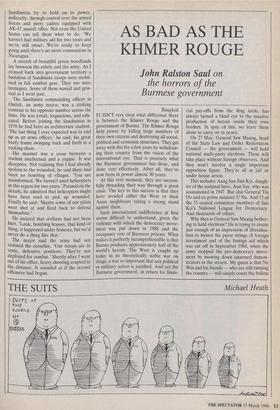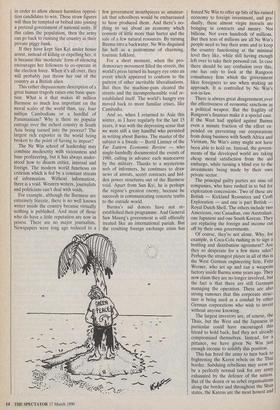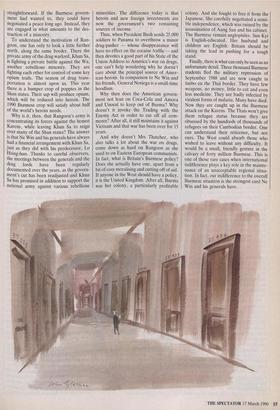AS BAD AS THE KHMER ROUGE
John Ralston Saul on
the horrors of the Burmese government
Bangkok IT ISN'T very clear what difference there is between the Khmer Rouge and the government of Burma. The Khmer Rouge held power by killing large numbers of their own citizens and destroying all social, political and economic structures. They got away with this for a few years by withdraw- ing their country from the vision of the international eye. That is precisely what the Burmese government has done, and done very effectively. After all, they've now been in power almost 30 years.
At this very moment, they are success- fully threading their way through a great crisis. The key to this success is that they have avoided either the West or their Asian neighbours taking a strong stand against them. Such international indifference at first seems difficult to understand, given the violence with which the democracy move- ment was put down in 1988 and the occupancy rate of Burmese prisons. What makes it perfectly incomprehensible is that Burma produces approximately half of the world's heroin. The West is caught up today in its theoretically noble war on drugs; a war so important that any political or military action is justified. And yet the Burmese government, in return for finan- cial pay-offs from the drug lords, has- always turned a blind eye to the massive production of heroin inside their own borders. In spite of this, we leave them alone to carry on in peace.
On 27 May, General Saw Maung, head of the State Law and Order Restoration Council — the government — will hold national multi-party elections. These will take place without foreign observers. And they won't involve a single important opposition figure. They're all in jail or under house arrest.
This includes Aung San Sun Kyi, daugh- ter of the national hero, Aun San, who was assassinated in 1947. But also General Tin Oo and ex-prime minister U Nu. And 15 of the 33 central committee members of Sun Kyi's National League for Democracy. And thousands of others.
Why then is General Saw Maung bother- ing to hold elections? He is trying to create just enough of an impression of liberalisa- tion to loosen the purse strings of foreign investment and of the foreign aid which was cut off in September 1988, when the army stopped the pro-democracy move- ment by mowing down unarmed demon- strators in the streets. My guess is that Ne Win and his friends — who are still running the country — will simply count the ballots in order to allow chosen harmless Opposi- tion candidates to win. These straw figures will then be tempted or bribed into joining a pretend government of national unity. If this calms ,the population, then the army can go back to running the country as their private piggy bank.
If they have kept Sun Kyi under house arrest, instead of killing or expelling her, it is because this 'moderate' form of silencing encourages her followers to co-operate in the election force. When it's all over, they will probably just throw her out of the country as a British alien.
This rather dispassionate description of a great human tragedy raises one basic ques- tion. What is it that makes 40 million Burmese so much less important on the moral scales of the world than, say, four million Cambodians or a handful of Panamanians? Why is there no popular outrage over the richest country in South Asia being turned into the poorest? The largest rich exporter in the world being broken to the point of having to import?
The Ne Win school of leadership may combine mediocrity with viciousness and base profiteering, but it has always under- stood how to disarm critics, internal and foreign. The modern world functions on criticism which is fed by a constant stream of information. Without information, there is a void. Western writers, journalists and politicians can't deal with voids.
For example, although the Burmese are extremely literate, there is no well known writer inside the country because virtually nothing is published. And most of those who do have a little reputation are now in prison. There are no major journalists. Newspapers were long ago reduced to a few government mouthpieces so amateur- ish that schoolboys would be embarrassed to have produced them. And there's no- thing to say about an economy which consists of little more than barter and the sale of a few natural resources. By turning Burma into a backwater, Ne Win disguised his hell as a pantomime of charming, touristic folklore.
For a short moment, when the pro- democracy movement filled the streets, the world's press turned its hungry eye onto an event which appeared to conform to the pattern of other inevitable liberalisations. But then the machine-guns cleared the streets and the incomprehensible void re- established itself. The world's hungry eye moved back to more familiar crises, like Cambodia.
And so, when I returned to Asia this winter, as I have regularly for the last 15 years, it was with the depressing sense that we were still a tiny handful who persisted in writing about Burma. The master of the subject is a Swede — Bertil Lintner of the Far Eastern Economic Review —, who single-handedly documented the events of 1988, calling in advance each manoeuvre by the military. Thanks to a mysterious web of informers, he continues to draw news of arrests, secret contracts and hid- den power structures out of the Burmese void. Apart from Sun Kyi, he is perhaps the regime's greatest enemy, because he succeeds in communicating concrete truths to the outside world.
Burma's aid donors have not re- established their programme. And General Saw Maung's government is still officially treated like an international pariah. But the resulting foreign exchange crisis has forced Ne Win to offer up bits of his ruined economy to foreign investment, and gra- dually, these almost virgin morsels are bringing in contracts and money. Not billions. Not even hundreds of millions.
But then tens of millions are all Ne Win's people need to buy their arms and to keep the country functioning at the minimal level they like, while still having enough left over to take their personal cut. In case there should be any confusion over this, one has only to look at the Rangoon consultancy firm which the government likes foreigners to use when making an approach. It is controlled by Ne Win's son-in-law.
There is always great disagreement: over the effectiveness of economic sanctions as a political weapon. But the fragility of Rangoon's finances make it a special case.
If the West had applied against Burma even a minute fraction of the effort ex- pended on preventing our corporations from doing business with South Africa and Vietnam, Ne Win's army might not have been able to hold on. Instead, the govern- ments of the developed world are taking cheap moral satisfaction from the aid
embargo, while turning a blind eye to the investments being made by their own private sector.
The principal guilty parties are nine oil companies, who have rushed in to bid for exploration concessions. Two of these are British — Kirkland Resources and Croft Exploration — and one is part British - Royal Dutch Shell. The others include two Americans, one Canadian, one Australian, one Japanese and one South Korean. They are replacing the foreign and income cut off by their own governments.
Of course, they're not alone. Why, for example, is Coca-Cola rushing in to sign a bottling and distribution agreement? Are they so desperate for a few more sales? Perhaps the strangest player in all of this is the West German engineering firm, Fritz Werner, who set up and ran a weapons factory inside Burma some years ago. They now claim they are no longer involved, but the fact is that there are still Germans managing the operation. There are also strong rumours that this corporate struc- ture is being used as a conduit by other German corporations who wish to invest without anyone knowing. The largest investors are, of course, the Thais, but the West and the Japanese in particular could have encouraged this friend to hold back, had they not already compromised themselves. Instead, for a pittance, we have given Ne Win just enough income to solidify this position. This has freed the army to turn back to frightening the Karen rebels on the Thai border. Subduing rebellions may seem to be a perfectly normal task for any army exhausted by the defence of the nation. But of the dozen or so rebel organisations along the border and throughout the Shan states, the Karens are the most honest and straightforward. If the Burmese govern- ment had wanted to, they could have negotiated a peace long ago. Instead, they are engaged in what amounts to the des- truction of a minority.
To understand the motivation of Ran- goon, one has only to look a little further north, along the same border. There the private army of the drug warlord, Khun Sa, is fighting a private battle against the Wa, another rebellious minority. They are fighting each other for control of some key opium trails. The season of drug trans- portation is almost upon us. This year there is a bumper crop of poppies in the Shan states. Their sap will produce opium, which will be reduced into heroin. The 1990 Burmese crop will satisfy about half of the world's heroin needs.
Why is it, then, that Rangoon's army is concentrating its forces against the honest Karens, while leaving Khun Sa to reign over many of the Shan states? The answer is that Ne Win and his generals have always had a financial arrangement with Khun Sa, just as they did with his predecessor, Lo Hsing-han. Thanks to careful observers, the meetings between the generals and the drug lords have been regularly documented over the years, as the govern- ment's cut has been readjusted and Khun Sa has promised in addition to support the national army against various rebellious minorities. The difference today is that heroin and new foreign investments are now the government's two remaining sources of income.
Thus, when President Bush sends 25,000 soldiers to Panama to overthrow a minor drug-pusher — whose disappearance will have no effect on the cocaine traffic — and then devotes a good part of his State of the Union Address to America's war on drugs, one can't help wondering why he doesn't care about the principal source of Amer- ican heroin. In comparison to Ne Win and his friends, General Noriega is a small-time hoodlum.
Why then does the American govern- ment not lean on Coca-Cola and Amoca and Unocal to keep out of Burma? Why doesn't it invoke the Trading with the Enemy Act in order to cut off all com- merce? After all, it still maintains it against Vietnam and that war has been over for 15 years. And why doesn't Mrs Thatcher, who also talks a lot about the war on drugs, come down as hard on Rangoon as she used to on Eastern European communists. In fact, what is Britain's Burmese policy? Does she actually have one, apart from a bit of easy moralising and cutting off of aid. If anyone in the West should have a policy, it is the United Kingdom. After all, Burma was her colony, a particularly profitable colony. And she fought to free it from the Japanese. She carefully negotiated a sensi- ble independence, which was ruined by the assassination of Aung San and his cabinet. The Burmese remain anglophiles. Sun Kyi is English-educated. Her husband and children are English. Britain should be taking the lead in pushing for a tough stand.
Finally, there is what can only be seen as an unfortunate detail. Three thousand Burmese students fled the military repression of September 1988 and are now caught in limbo on the Thai border. They have few weapons, no money, little to eat and even less medicine. They are badly infected by virulent forms of malaria. Many have died. Now they are caught up in the Burmese attack on the Karens. The Thais won't give them refugee status because they are obsessed by the hundreds of thousands of refugees on their Cambodian border. One can understand their reticence, but not ours. The West could absorb those who wished to leave without any difficulty. It would be a small, friendly gesture in the calvary of forty million Burmese. This is one of those rare cases when international indifference plays a key role in the mainte- nance of an unacceptable regional situa- tion. In fact, our indifference to the overall Burmese situation is the strongest card Ne Win and his generals have.




























































 Previous page
Previous page